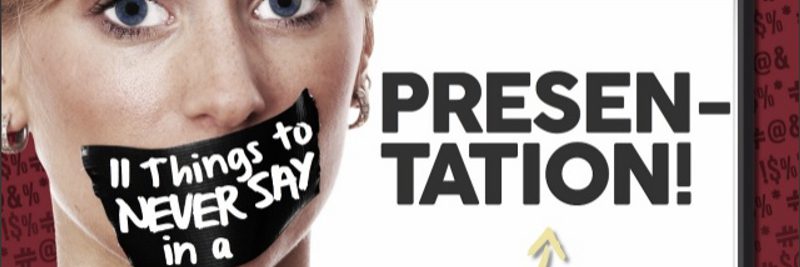More often than not, when looking for advice about presentations, people will tell you things that you should do. From practicing ahead of time to knowing your material inside and out, you have probably heard it all before. So let’s not do that. Instead, let’s focus on the things you should not do when giving a presentation. In particular, we will focus on things you should not say. Read down the following list and if you see yourself making one of these mistakes, change up your presentation skills fast.
An Excuse
Whether you believe it or not when you stand on the stage, your audience is rooting for you. They want this to be an awesome experience worth their time, and they want you to be the hero. That is why you should never begin a presentation with an excuse. It literally is a self-fulfilling prophecy where you set yourself up for failure. By admitting that there is something wrong even before you begin, you make your audience resent you. That is why you should stay away from such words as “I’m very jet lagged,” “I’m tired,” “I forgot my notes,” etc.
Demand
Some things you should never say are, “Please pay attention,” “shut off your laptops,” “turn off your cell phones,” etc. Whenever you give a demand, you make your audience resent you as it is insulting to their intelligence. The truth is, regardless of what you ask, people are going to be stupid and ignore you. They are stupid because they are taking the time to literally be in the same room as you, and then ignore you. Do not take it personally. Instead, do not make demands and focus on giving an excellent presentation. Make them keenly aware that they purposefully missed a great lecture by making it engaging, fun, and informative.
Time
Many times, people will say things regarding the time of their presentation. Sayings like “I will keep it short,” “We have a lot to cover,” and “if only we had more time,” relate to your audience that you are unprepared or that your information is not worth a full level of attention. What might be seen as you trying to relate to your audience instead hurts your relationship with them, making it a greater challenge to inform them.
With all this in mind, good luck during your next presentation.
Strong proponent of individual liberty and free speech. My goal is to present information that expands our awareness of crucial issues and exposes the manufactured illusion of freedom that we are sold in America. Question everything because nothing is what it seems.



















